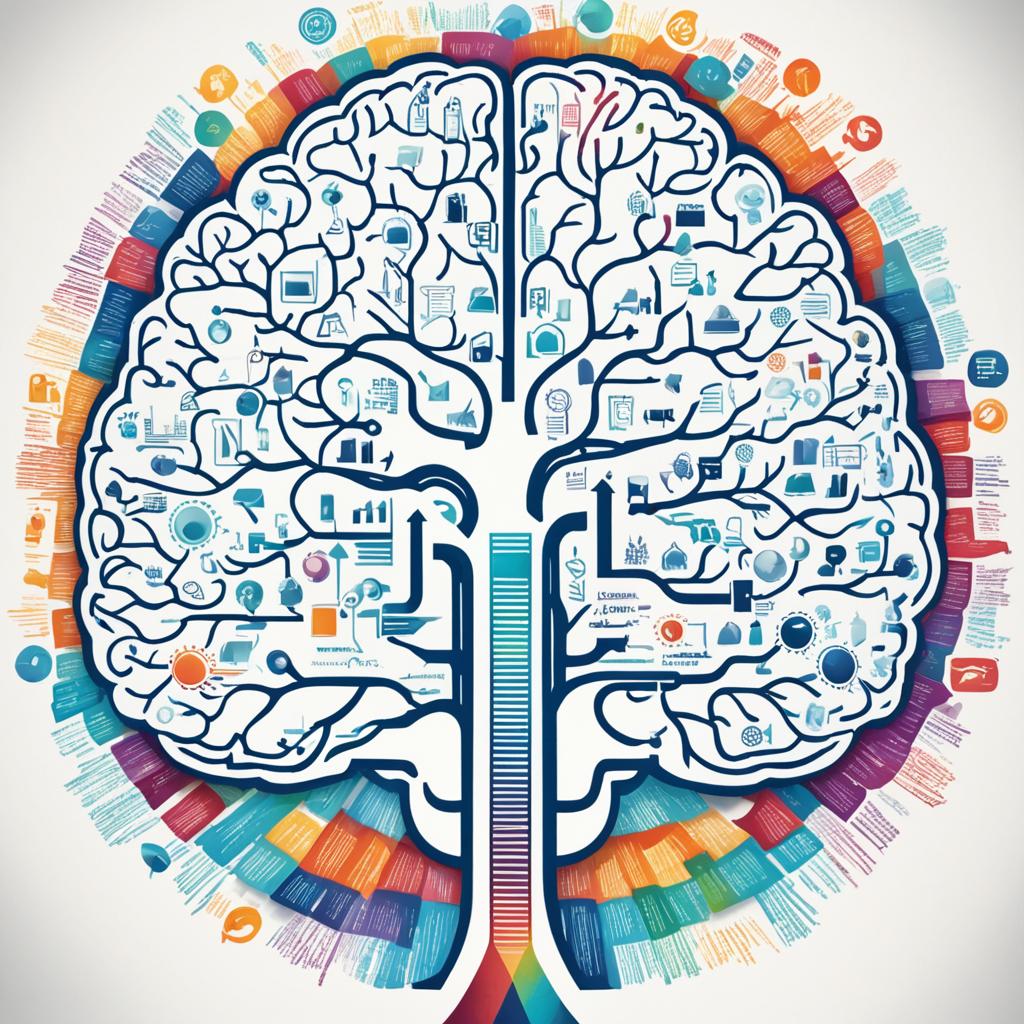Did you know that the average person forgets nearly half of the information they learn within 20 minutes?
Memory is a fascinating aspect of our cognition, allowing us to store and recall information. However, our ability to retain what we learn is far from perfect. In this article, we will explore the intricate mechanisms behind how we remember and forget. We will dive into the workings of memory, cognitive processes, and the powerful mnemonic techniques that can enhance our ability to retain information.
Understanding Memory Formation
Memory formation is a fascinating process that involves the encoding, storage, and retrieval of information. By understanding how these stages work, we can gain valuable insights into the inner workings of our memory systems.
During the encoding stage, our brain processes and transforms incoming sensory information into a format that can be stored and retrieved later. This involves the conversion of sensory stimuli, such as sights, sounds, and smells, into meaningful representations that can be organized and stored.
Once information is encoded, it is stored in various memory systems. Short-term memory, also known as working memory, temporarily holds and processes information for immediate use. It has limited capacity and can be easily disrupted by distractions.
Long-term memory, on the other hand, has a vast capacity and is responsible for storing information for extended periods. This type of memory plays a crucial role in our ability to remember personal experiences, facts, and skills. It is believed that memories stored in long-term memory can last a lifetime, although they may become less accessible over time.
The final stage of memory formation is retrieval, where stored information is recalled and brought back into awareness. Retrieval can be influenced by various factors, such as the strength of the encoded memory, the context in which the information was learned, and the cues available during retrieval.
Memory formation is a complex process that involves encoding, storage, and retrieval. It allows us to acquire new knowledge, retain important experiences, and recall information when needed.
Understanding memory formation is crucial in our quest to improve our memory and cognitive abilities. By exploring the intricacies of memory encoding, storage, and retrieval, we can develop effective strategies to enhance our memory function.


Key points:
- Memory formation involves the encoding, storage, and retrieval of information.
- During encoding, sensory information is transformed into a format that can be stored.
- Information is stored in short-term and long-term memory systems.
- Retrieval is the process of bringing stored information back into awareness.
The Three Stages of Memory
In the realm of memory, there are three distinct stages that contribute to our ability to remember and forget: sensory memory, short-term memory, and long-term memory. Each of these stages plays a crucial role in shaping our cognitive function and retaining information. Let’s dive deeper into each stage and understand their significance.
Sensory Memory
At the initial stage of memory processing, sensory memory comes into play. This type of memory allows us to briefly retain sensory information from our environment. It acts as a temporary buffer, storing experiences in their raw forms before they either fade away or move on to the next stage. Think of sensory memory as a snapshot of the present moment, capturing sights, sounds, smells, tastes, and touch. While sensory memory has a limited duration, it is essential in providing continuity and coherence to our perception of the world.
Short-Term Memory
Once information is transferred from sensory memory, it enters the realm of short-term memory. Also known as working memory, this stage holds a limited amount of information for a brief period, typically around 20 seconds. Short-term memory allows us to manipulate and process information consciously, making it vital for tasks such as problem-solving, decision-making, and comprehension. However, without rehearsal or active encoding, information in short-term memory can quickly fade away, making it susceptible to forgetting.
Long-Term Memory
Long-term memory is where lasting memories are stored for an extended period. This stage involves the encoding, consolidation, and retrieval of information, making it available for future recall. Long-term memory has a vast storage capacity capable of retaining memories for minutes, hours, days, or even a lifetime. It is further divided into subcategories including explicit or declarative memory (conscious recall of facts and events) and implicit or procedural memory (unconscious recall of skills and habits). The strength and durability of long-term memories depend on various factors, including the depth of encoding, emotional significance, and overall relevance.
Our memory system operates like a well-orchestrated symphony, with sensory memory providing the initial notes, short-term memory conducting the immediate melody, and long-term memory preserving the timeless composition.
Understanding the three stages of memory paves the way for exploring the intricacies of memory formation, factors influencing memory function, and effective memory enhancement techniques. By unraveling the mysteries of sensory memory, short-term memory, and long-term memory, we can unlock our cognitive potential and harness the power of our recollections.
Factors Affecting Memory
Memory function can be influenced by various factors that play a significant role in how well we remember and forget. Understanding these influences can help us develop strategies to optimize our memory function. Let’s explore some key factors:
1. Age
Age is an important factor that can impact memory. As we grow older, our cognitive abilities may change, including memory processes. Older adults may experience a decline in memory function compared to younger individuals.
2. Emotions
Our emotions can have a profound effect on memory. Strong emotional experiences, whether positive or negative, are often more memorable than neutral events. Emotions can enhance the encoding and retrieval of memories, leading to better retention.
3. Sleep
Sleep plays a crucial role in memory consolidation. While we sleep, our brain processes and strengthens the memories formed during the day. Sufficient quality sleep is essential for optimal memory function.
4. Stress
Stress can significantly impact memory performance. High levels of stress can impair both encoding and retrieval processes, making it difficult to remember information accurately. Managing stress is vital for maintaining optimal memory function.
To optimize memory function, it is important to consider these factors and incorporate strategies that promote healthy aging, emotional well-being, quality sleep, and stress management.


Memory Enhancement Techniques
When it comes to enhancing memory, mnemonic techniques provide powerful tools to improve retention and recall. These techniques leverage the inherent strengths of the human brain, such as visualization, chunking, and repetition, to optimize memory function.
Mnemonic techniques involve creating mental associations, images, or patterns that link new information to existing knowledge or vivid visual representations. By engaging multiple senses and creating strong connections in the brain, mnemonic techniques enhance memory encoding and retrieval.
- Visualization: Visualizing information can significantly enhance memory. By creating vivid mental images related to the content you want to remember, you tap into the brain’s ability to recall visual details with greater ease. For example, if you’re trying to memorize a list of items, visualize yourself interacting with each object in a memorable way.
- Chunking: Chunking involves breaking down complex information into smaller, more manageable chunks. By organizing content into meaningful groups or categories, you make it easier for your brain to process and remember. This technique is particularly useful when memorizing long sequences of numbers, words, or concepts. For example, instead of remembering a random string of numbers (1234567890), you can chunk them into smaller groups (123-456-7890) and remember each group individually.
- Repetition: Repetition is a fundamental mnemonic technique that strengthens memory recall. By reviewing and rehearsing the information multiple times, you reinforce the neural pathways associated with the content, making it easier to retrieve later. You can use various repetition strategies, such as spaced repetition (revisiting information at intervals over time) or active recall (testing yourself on the material), to enhance memory retention.
By incorporating mnemonic techniques into your learning and study routines, you can optimize your memory performance and improve knowledge retention. These techniques are applicable across various domains, including education, work, and everyday life, offering valuable tools for enhancing memory and maximizing cognitive potential.
“Mnemonic techniques provide valuable strategies for enhancing memory. By leveraging visualization, chunking, and repetition, individuals can optimize their memory function and improve knowledge retention.”
To further illustrate the power of mnemonic techniques in memory enhancement, consider this visualization:


By exploring and implementing these mnemonic techniques, you can unlock your memory potential and enhance your ability to remember and recall information more effectively.
Memory and Cognitive Functions
In the intricate workings of memory, cognitive functions play a vital role. Attention, perception, and working memory are key components that contribute to memory formation and retrieval.
Attention is the ability to focus on specific stimuli while filtering out distractions. When attention is directed towards relevant information, it enhances the encoding process, leading to better memory consolidation.
Perception involves the interpretation and understanding of sensory information. The brain’s perception of our surroundings influences what we remember and how we recall it. For example, when we pay close attention to details or engage our senses, such as smell or taste, we create rich memories that are more likely to be retained.
Working memory is the temporary storage and manipulation of information. It enables us to hold and process data in our mind while performing tasks. Working memory plays a crucial role in linking new information with existing knowledge, facilitating the encoding and retrieval of memories.
“The ability to pay attention to relevant details, perceive the world around us accurately, and utilize working memory effectively are essential for optimal memory functioning.”
By understanding the relationship between these cognitive functions and memory, we can develop strategies to enhance our memory abilities. Techniques such as focusing on important information, engaging our senses, and employing mnemonic strategies that utilize working memory can improve memory encoding and retrieval processes.


Learning how attention, perception, and working memory contribute to memory formation and retrieval empowers us to make conscious efforts to optimize our memory processes. By harnessing the power of these cognitive functions, we can enhance our ability to remember and retain information more effectively.
Memory Disorders and Conditions
Memory disorders and conditions can significantly impact our ability to remember. In this section, we will explore three common memory-related issues: amnesia, Alzheimer’s disease, and dementia.
Amnesia
Amnesia is a condition characterized by partial or complete loss of memory. It can result from various factors, such as brain injury, stroke, or psychological trauma. Individuals with amnesia may struggle to recall past events, form new memories, or retain information for a short period of time.
Alzheimer’s Disease
Alzheimer’s disease is a progressive neurological disorder that primarily affects older adults. It causes a decline in memory, thinking, and overall cognitive function. As the disease progresses, individuals may experience confusion, disorientation, and difficulty communicating. Alzheimer’s disease is the most common cause of dementia.
Dementia
Dementia is a broad term used to describe a group of symptoms associated with a decline in cognitive abilities. It can be caused by various conditions, including Alzheimer’s disease, vascular dementia, and Lewy body dementia. Individuals with dementia may struggle with memory loss, impaired judgment, and changes in behavior and personality.
Understanding these memory disorders and conditions is crucial in providing appropriate support and care for individuals affected by them. By raising awareness and fostering research, we can work towards improving the lives of those living with these conditions and finding effective treatments.


Stay tuned for the next section, where we will discuss strategies for improving memory and optimizing cognitive function.
Strategies for Improving Memory
Improving memory is not only about retaining information but also enhancing cognitive function. By adopting a healthy lifestyle, embracing mindfulness, and engaging in brain exercises, we can optimize our memory potential. Let’s explore these practical strategies:
- Adopt a Healthy Lifestyle: A healthy lifestyle directly impacts our brain function and memory. Regular physical exercise, a balanced diet rich in fruits, vegetables, and whole grains, and adequate sleep contribute to optimal cognitive performance. Prioritizing these aspects of a healthy lifestyle can enhance memory function.
- Practice Mindfulness: Mindfulness, the practice of being fully present in the moment, can have positive effects on memory. Mindfulness exercises, such as meditation and deep breathing, help reduce stress levels, improve attention, and promote better memory consolidation. Incorporating mindfulness techniques into our daily routine can enhance memory retention.
- Engage in Brain Exercises: Just like physical exercise strengthens our muscles, brain exercises enhance our cognitive abilities, including memory. Activities like puzzles, crosswords, and memory games stimulate neural connections, promote mental flexibility, and boost memory performance. Regularly challenging our brain with these exercises can enhance memory function over time.
By combining these strategies and making them a part of our daily lives, we can improve our memory and overall cognitive functioning. Remember, a healthy lifestyle, mindfulness, and brain exercises are powerful tools for enhancing memory and unlocking our full potential.
Conclusion
In understanding the secrets of memory, we gain valuable insights into the complex processes that govern how we remember and forget. We have explored memory formation, the three stages of memory, and the factors that influence memory function.
Moreover, we have discovered the power of mnemonic techniques and how they can enhance our ability to retain information. By employing strategies such as visualization, chunking, and repetition, we can optimize our memory performance.
Furthermore, our exploration of memory and cognitive functions has highlighted the interplay between attention, perception, and working memory in memory formation and retrieval. These cognitive processes contribute to our ability to remember and store information.
Lastly, we have examined memory disorders and conditions, such as amnesia, Alzheimer’s disease, and dementia, that can disrupt memory function. By understanding these conditions, we can cultivate empathy and support for individuals navigating the challenges associated with memory loss.
By applying the knowledge gained throughout this journey, we can unlock our memory potential and optimize our cognitive abilities. Whether through adopting a healthy lifestyle, practicing mindfulness, or engaging in brain exercises, there are tangible strategies for improving memory and enhancing overall cognitive performance.
